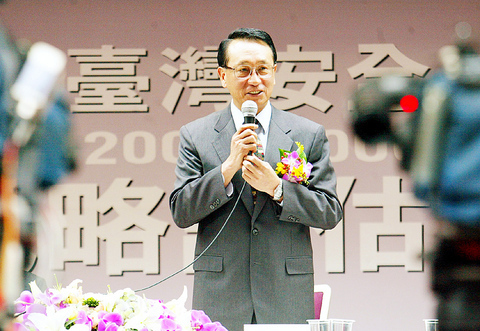The credibility of national leaders, the issue of national identification, the economy, military might, cross-strait relations and the US government's cross-strait policies were the key elements affecting Taiwan's national security, a former head of the National Security Bureau said yesterday.
Former bureau director Ting Yu-chou (
As Taiwan faced unprecedented challenges and risks, Ting said that wisdom, patience and skill were required to safeguard national security, especially in the face of the threat posed by China.

PHOTO: CNA
"How do we expect a divided Taiwan to defeat a rising China?" Ting said. "We cannot depend solely on the assistance of the US government, nor pin our hopes on China's goodwill. After all, there is no such thing as cheap or lucky security."
Leaders from both sides of the Taiwan Strait, Ting said, were duty bound to create a stable and peaceful environment for their people. These leaders should realize the fact that military means would not and could not resolve cross-strait disputes, he said.
Ting made the remarks yesterday morning during a book launch held in Taipei. The book, Taiwan Security 2005-2006, was published by the Cross-Strait Interflow Prospect Foundation, a private think tank. Ting is the book's chief editor and the author of its first chapter.
Commenting on the just-concluded economic forum between the Chinese Communist Party and the Chinese Nationalist Party (KMT), Ting called on the administration to respond to the proposals brought back by the KMT in keeping with the the public and the national interest. Government responses should be feasible and seek to minimize risks, he said.
Chang Hsi-mo (張錫模) of the Sun Yat-sen Institute for Interdisciplinary Studies at National Sun Yat-sen University, who penned the second chapter of the book focusing on political security, said that Taiwan's democratic system was fragile because politics had become of interest to only a minority, and government policies were inconsistent.
In addition, politicians usually resorted to nationalism to stir up ethnic tension, seriously sabotaging the true spirit of Taiwan's democracy, Chang said.
Compounding the problem was China's military threat, Taiwan's crisis of confidence and the illusion of peace, he said. Together, the problems had dealt a serious blow to the administration's efforts to safeguard national security and manage crises, he said.
"We're sorry to see that the administration has failed to tell us exactly what they plan to do if China does launch a military attack or economic sanctions," he said. "Such lack of contingency planning is, in my view, the biggest crisis facing the nation."
Chang proposed that President Chen Shui-bian (陳水扁) take full advantage of the National Security Council, which is the nation's highest decision-making body on issues of national security. To ensure the professionalism and independence of the organization, Chang said that political and partisan considerations should not be allowed to influence either the council or its daecision-making process.
The administration should also regulate foreign investment, both direct and indirect, in local media outlets and political parties, he said. During cross-strait negotiations, Chang said the government must insist on equality.

US President Donald Trump said "it’s up to" Chinese President Xi Jinping (習近平) what China does on Taiwan, but that he would be "very unhappy" with a change in the "status quo," the New York Times said in an interview published yesterday. Xi "considers it to be a part of China, and that’s up to him what he’s going to be doing," Trump told the newspaper on Wednesday. "But I’ve expressed to him that I would be very unhappy if he did that, and I don’t think he’ll do that," he added. "I hope he doesn’t do that." Trump made the comments in

NOT AN OPENING: Trump’s violation of international law does not affect China’s consideration in attacking Taiwan; Beijing lacks capability, not precedent, an official said Taiwanese officials see the US’ capture of the president of Venezuela as a powerful deterrent to Beijing’s aggression and a timely reminder of the US’ ability to defeat militaries equipped with Chinese-made weapons. The strikes that toppled Venezuelan President Nicolas Maduro signaled to authoritarian leaders, including Chinese President Xi Jinping (習近平), US President Donald Trump’s willingness to use military might for international affairs core to US interests, one senior official in Taipei’s security circle said. That reassured Taiwan, the person said. Taipei has also dismissed the idea that Trump’s apparent violation of international law could embolden Beijing, said the official, who was not

A cold surge advisory was today issued for 18 cities and counties across Taiwan, with temperatures of below 10°C forecast during the day and into tonight, the Central Weather Administration (CWA) said. New Taipei City, Taipei, Taoyuan and Hsinchu, Miaoli and Yilan counties are expected to experience sustained temperatures of 10°C or lower, the CWA said. Temperatures are likely to temporarily drop below 10°C in most other areas, except Taitung, Pingtung, Penghu and Lienchiang (Matsu) counties, CWA data showed. The cold weather is being caused by a strong continental cold air mass, combined with radiative cooling, a process in which heat escapes from

Snow this morning fell on Alishan for the first time in seven years, as a strong continental cold air mass sent temperatures plunging across Taiwan, the Central Weather Administration (CWA) said. The Alishan weather station, located at an elevation of about 2,200m in central Taiwan, recorded snowfall from 8:55am to 9:15am, when the temperature dropped to about 1°C, the CWA said. With increased moisture and low temperatures in the high-altitude Alishan area, the conditions were favorable for snow, CWA forecaster Tsai Yi-chi (蔡伊其) said. The last time snow fell at the Alishan weather station was on Jan. 10, 2018, while graupel fell there